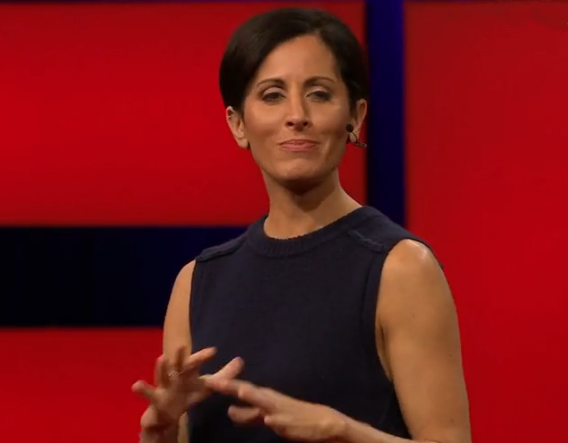How can this be? We think it's because these nuns had a high level of cognitive reserve,
這是怎么回事呢?我們認為這是因為這些修女擁有高級的認知儲備,
which is a way of saying that they had more functional synapses.
意味著她們有功能更強的突觸。
People who have more years of formal education, who have a high degree of literacy,
接受正式教育的時間越長的人,擁有較強讀寫能力的人,
who engage regularly in mentally stimulating activities, all have more cognitive reserve.
定期參加刺激心理活動的人,這些人都有更高的認知儲備。
They have an abundance and a redundancy in neural connections.
他們有著大量甚至多余的神經(jīng)連接。
So even if they have a disease like Alzheimer's compromising some of their synapses,
所以即使他們患上老年癡呆等疾病損傷了部分突觸,
they've got many extra backup connections, and this buffers them from noticing that anything is amiss.
他們依然有充足的額外后備連接,而這減緩了他們的大腦產(chǎn)生混亂。
Let's imagine a simplified example. Let's say you only know one thing about a subject. Let's say it's about me.
讓我們來看一個簡單的例子。假設(shè)你只知道關(guān)于某一主題的一件事。比方說是關(guān)于我的。
You know that Lisa Genova wrote "Still Alice," and that's the only thing you know about me.
你知道麗莎·吉諾瓦寫下了《依然愛麗絲》,這是你唯一知道的關(guān)于我的事。
You have that single neural connection, that one synapse. Now imagine you have Alzheimer's.
你擁有一處單一的神經(jīng)連接,那一個特定突觸。如果現(xiàn)在你患上了老年癡呆。
You have plaques and tangles and inflammation and microglia devouring that synapse.
你有樣斑塊、神經(jīng)纖維纏結(jié)和炎癥,并且小神經(jīng)膠質(zhì)細胞吞噬了那一突觸。
Now when someone asks you, "Hey, who wrote 'Still Alice?'" you can't remember,
現(xiàn)在若有人問起你,“嘿,誰寫了《依然愛麗絲》?”你無法回想起來了,
because that synapse is either failing or gone. You've forgotten me forever.
因為那個突觸要么衰弱要么消失了。你把我忘得一干二凈。

But what if you had learned more about me? Let's say you learned four things about me.
但是如果你對我了解更深呢?比如你了解我的四件事情。
Now imagine you have Alzheimer's, and three of those synapses are damaged or destroyed.
現(xiàn)在如果你患上了老年癡呆,即使三處突觸已損傷或者毀壞。
You still have a way to detour the wreckage. You can still remember my name.
你依然有一條路來繞過阻礙找到我的信息。你依然記得我的名字。
So we can be resilient to the presence of Alzheimer's pathology through the recruitment of yet-undamaged pathways.
所以我們可以通過使用那些未損壞的通路有效應(yīng)對老年癡呆。
And we create these pathways, this cognitive reserve, by learning new things.
同時我們通過學習新事物,創(chuàng)造了新的通路,改變著認知儲備。
Ideally, we want these new things to be as rich in meaning as possible, recruiting sight and sound and associations and emotion.
理想情況下,我們希望這些新事物的意義盡可能豐富,吸納視覺與聽覺的聯(lián)合感受。
So this really doesn't mean doing crossword puzzles.
所以這并不意味著去做橫縱字謎游戲。
You don't want to simply retrieve information you've already learned,
你不希望去重拾那些你早已學會的信息,
because this is like traveling down old, familiar streets, cruising neighborhoods you already know.
這就好比游覽老舊的熟悉街道,那些周邊環(huán)境你早已了然于心。
You want to pave new neural roads. Building an Alzheimer's-resistant brain means learning to speak Italian,
你想要開辟新的神經(jīng)道路。使你的大腦抵抗老年癡呆,意味著學習說意大利語,
meeting new friends, reading a book, or listening to a great TED Talk.
去遇見新朋友,讀一本書,或是聽一場精彩的TED演講。
And if, despite all of this, you are someday diagnosed with Alzheimer's,
如果做了所有的這一切之后,有一天你被診斷為老年癡呆,
there are three lessons I've learned from my grandmother and the dozens of people I've come to know living with this disease.
我從我的祖母以及我認識的許多患者中學習到了三件事情。
Diagnosis doesn't mean you're dying tomorrow. Keep living.
診斷并不意味著死期將至。頑強地活下去吧。
You won't lose your emotional memory. You'll still be able to understand love and joy.
你不會丟失你的情感記憶。你依然可以理解愛與喜悅。
You might not remember what I said five minutes ago, but you'll remember how I made you feel.
你也許不會記得我五分鐘前的話語,但是你依然會記得我?guī)Ыo你的感受。
And you are more than what you can remember. Thank you.
你遠勝于你所能記住的一切。謝謝。



